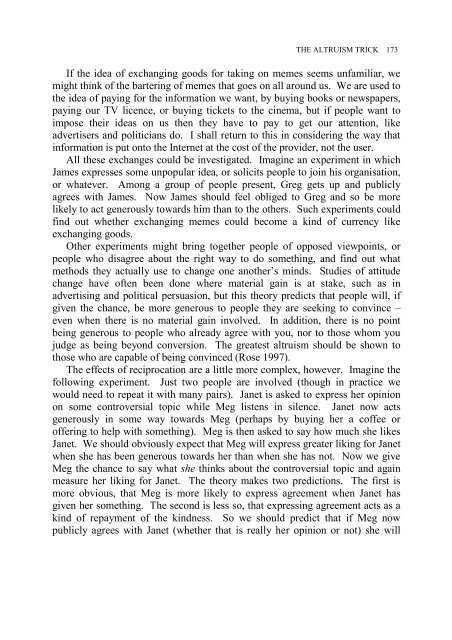The Meme Machine
TheMemeMachine1999
TheMemeMachine1999
- No tags were found...
You also want an ePaper? Increase the reach of your titles
YUMPU automatically turns print PDFs into web optimized ePapers that Google loves.
THE ALTRUISM TRICK 173<br />
If the idea of exchanging goods for taking on memes seems unfamiliar, we<br />
might think of the bartering of memes that goes on all around us. We are used to<br />
the idea of paying for the information we want, by buying books or newspapers,<br />
paying our TV licence, or buying tickets to the cinema, but if people want to<br />
impose their ideas on us then they have to pay to get our attention, like<br />
advertisers and politicians do. I shall return to this in considering the way that<br />
information is put onto the Internet at the cost of the provider, not the user.<br />
All these exchanges could be investigated. Imagine an experiment in which<br />
James expresses some unpopular idea, or solicits people to join his organisation,<br />
or whatever. Among a group of people present, Greg gets up and publicly<br />
agrees with James. Now James should feel obliged to Greg and so be more<br />
likely to act generously towards him than to the others. Such experiments could<br />
find out whether exchanging memes could become a kind of currency like<br />
exchanging goods.<br />
Other experiments might bring together people of opposed viewpoints, or<br />
people who disagree about the right way to do something, and find out what<br />
methods they actually use to change one another’s minds. Studies of attitude<br />
change have often been done where material gain is at stake, such as in<br />
advertising and political persuasion, but this theory predicts that people will, if<br />
given the chance, be more generous to people they are seeking to convince –<br />
even when there is no material gain involved. In addition, there is no point<br />
being generous to people who already agree with you, nor to those whom you<br />
judge as being beyond conversion. <strong>The</strong> greatest altruism should be shown to<br />
those who are capable of being convinced (Rose 1997).<br />
<strong>The</strong> effects of reciprocation are a little more complex, however. Imagine the<br />
following experiment. Just two people are involved (though in practice we<br />
would need to repeat it with many pairs). Janet is asked to express her opinion<br />
on some controversial topic while Meg listens in silence. Janet now acts<br />
generously in some way towards Meg (perhaps by buying her a coffee or<br />
offering to help with something). Meg is then asked to say how much she likes<br />
Janet. We should obviously expect that Meg will express greater liking for Janet<br />
when she has been generous towards her than when she has not. Now we give<br />
Meg the chance to say what she thinks about the controversial topic and again<br />
measure her liking for Janet. <strong>The</strong> theory makes two predictions. <strong>The</strong> first is<br />
more obvious, that Meg is more likely to express agreement when Janet has<br />
given her something. <strong>The</strong> second is less so, that expressing agreement acts as a<br />
kind of repayment of the kindness. So we should predict that if Meg now<br />
publicly agrees with Janet (whether that is really her opinion or not) she will



